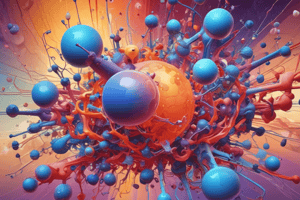Podcast
Questions and Answers
Give an example of a phase transition from liquid to gas.
Give an example of a phase transition from liquid to gas.
Water boiling into steam
What happens when the temperature or pressure of a gas is decreased?
What happens when the temperature or pressure of a gas is decreased?
It can turn into a liquid (condensation)
Describe the phase transition from gas to solid.
Describe the phase transition from gas to solid.
Deposition
Why is understanding states of matter essential in studying chemistry, physics, and environmental science?
Why is understanding states of matter essential in studying chemistry, physics, and environmental science?
What are the three primary states of matter?
What are the three primary states of matter?
How do solids differ from liquids?
How do solids differ from liquids?
Explain the characteristics of gases.
Explain the characteristics of gases.
What is the process called when matter changes states?
What is the process called when matter changes states?
Study Notes
Matter's Many Forms: Understanding States of Matter
In our daily lives, we encounter various forms of matter—from the solid ice under our feet in winter to the vapor we see rising from a boiling kettle. These transformations and common manifestations of matter are a result of its three primary states: solid, liquid, and gas.
Solids
Solids have a rigid structure, meaning their particles are closely packed together, vibrating around fixed positions. They retain a specific shape, volume, and location. Examples of solids include metals, rocks, rubber, and glass.
Liquids
Liquids are less rigid than solids, with their particles held together by weaker intermolecular forces. They flow and take the shape of their containers. Liquids can change shape, but they maintain a constant volume. Examples of liquids are water, oil, and mercury.
Gases
Gases are highly expansive and have no fixed shape or location. Their particles have a tremendous amount of space between them, and they are in constant motion. Gases compress and expand to fill their containers. Examples of gases include air, hydrogen, and carbon dioxide.
State Changes
Matter can change states through a process called phase transitions. These changes occur when the temperature, pressure, or both, are altered. For instance:
- Solid to liquid (melting): When a solid is heated, it can change to a liquid by increasing its temperature or decreasing its pressure. Examples of this phase transition are ice melting into water, or a bar of soap melting in hot water.
- Liquid to gas (vaporization): When a liquid is heated or exposed to low pressure, it can turn into a gas. An example of this phase transition is water boiling into steam.
- Gas to liquid (condensation): When the temperature or pressure of a gas is decreased, it can turn into a liquid. An example of this phase transition is when water vapor forms into droplets of water in fog.
- Gas to solid (deposition): When a gas is cooled and exposed to surfaces with specific properties, it can form a solid. An example of this phase transition is frost forming on a cold window pane.
Understanding states of matter and the factors that cause them to change is essential for studying chemistry, physics, and environmental science, as well as for everyday applications such as cooking, heating, and cooling.
As we've seen, there's more to matter than meets the eye. By understanding its states, we can appreciate the fascinating transformations that occur all around us. Whether you're making a cup of tea or marveling at a snowflake's intricate design, you can now appreciate the underlying physics and chemistry that truly define its nature.
Studying That Suits You
Use AI to generate personalized quizzes and flashcards to suit your learning preferences.
Description
Learn about the fundamental states of matter—solid, liquid, and gas—and how they change through phase transitions. Discover the characteristics of each state and examples of common substances found in each category. Gain insights into the physics and chemistry behind the transformations of matter in our daily lives.




